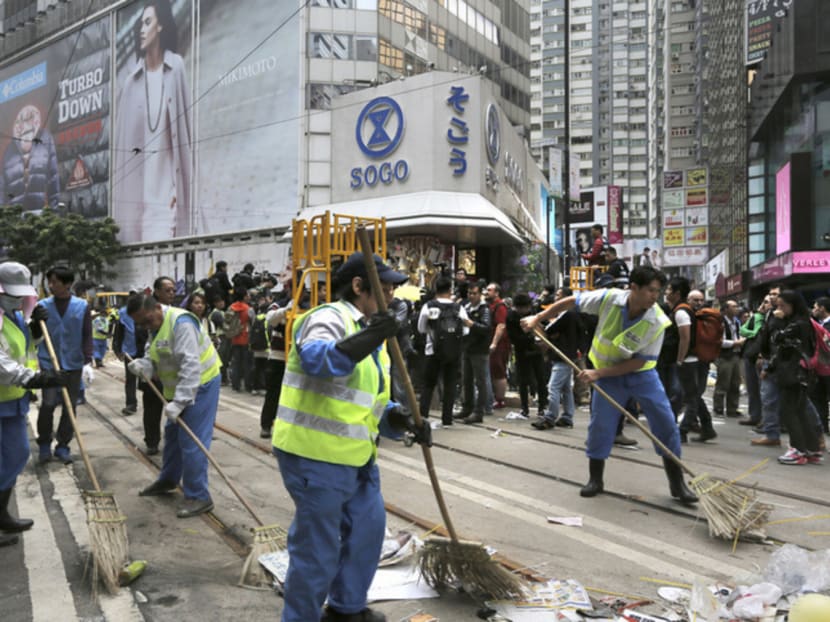HK chief declares end to Occupy as last site cleared
HONG KONG — The Chief Executive of Hong Kong declared an end to the pro-democracy protests that blocked the city’s roads for more than 11 weeks, as the police cleared the last demonstration site yesterday.

Workers cleaning up after the police cleared barricades and tents on a main road in Causeway Bay, Hong Kong, yesterday. Photo: AP
HONG KONG — The Chief Executive of Hong Kong declared an end to the pro-democracy protests that blocked the city’s roads for more than 11 weeks, as the police cleared the last demonstration site yesterday.
Cars and trams returned to areas of the popular Causeway Bay shopping district that had been taken over by protesters, after police officers dismantled barricades and took down tents. More than 10 demonstrators, including lawmaker Kenneth Chan, were taken away by the police as they refused to leave and staged a sit-in.
“As the clearance of the Occupy site in Causeway Bay finishes, the illegal movement in Hong Kong that has lasted for over two months has come to an end,” Chief Executive Leung Chun-ying told reporters. “People should reflect and conclude on an important topic: What kind of democracy should Hong Kong be looking for?” He reiterated that discussion on electoral changes must be based on the Basic Law, the city’s de facto Constitution.
The street protests were kick-started on Sept 26 when student leaders stormed the premises of the government headquarters and drew as many as 100,000 people after the police used tear gas in an attempt to disperse the demonstrators on Sept 28. It became the biggest challenge to China’s rule over Hong Kong since it resumed sovereignty over the former British colony in 1997.
Demonstrators had demanded China reverse its decision to vet Chief Executive candidates for the city’s first leadership election in 2017 through a nominating committee, a mechanism the pro-democracy camp said will select only prospective leaders favoured by Beijing.
The protest site in Causeway Bay has been the smallest since demonstrators started occupying key roads. The police removed the roadblocks at the main Admiralty district protest site near the government offices with little interference on Dec 11, after clearance of another site in Mong Kok resulted in some clashes last month.
Hong Kong’s Legislative Council asked a small number of protesters who have tents set up around the council’s offices to clear out and may seek police assistance if they refuse, council president Jasper Tsang said.
Public support for the pro-democracy protests waned after weeks of traffic and business disruption, while disagreements over tactics grew among the protest leaders. About 68 per cent of 513 people surveyed by the University of Hong Kong said the government should act to end the protests, based on a poll conducted on Nov 17 and 18.
“Street protests and clashes coming to an end doesn’t mean the people have reconciled after the split, nor has the political reform outlook become brighter,” Hong Kong Financial Secretary John Tsang wrote in a blog on Sunday.
The government will probably start the next round of consultations on the 2017 Chief Executive elections in January, the Mingpao newspaper reported on Sunday, citing Secretary for Constitutional and Mainland Affairs Raymond Tam. BLOOMBERG





